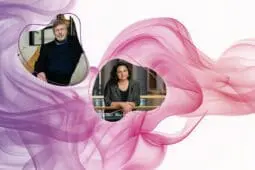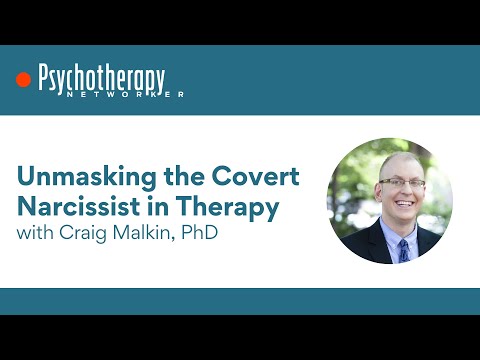Contributed by Livia Kent
Editor's Note: May/June 2025
Exploring Therapy's Shifting Boundaries & Ethical SinkholesThis issue aims to draw attention to underlying forces having a big effect not only on the individual practices of on-the-ground therapists, but on the... Read more
Editor's Note: March/April 2025
Understanding PDA, High-Masking Clients, and Neurodivergent BurnoutPutting together this issue has changed me. And I hope it helps all therapists update their understanding of the wide spectrum of neurodivergence, and the... Read more
Editor's Note: January/February 2025
Spirituality and PsychotherapyMany therapists have been trained to avoid exploring people’s religious or spiritual beliefs, lest they accidentally question them or unknowingly pull at the... Read more
The Beauty of Longing and Melancholy
Susan Cain Celebrates the Sensitive Client"Bittersweet" invites us to better understand and celebrate the wistful, sensitive people in our lives—and in our therapy practices. Read more
God, Grief and Therapy
The Quest for Meaning after LossRenowned grief expert David Kessler shares what can grief work teach us about the role of religious beliefs in therapy. Read more
Editor's Note: November/December 2024
Facing the Realities of Emotional AbuseThe more informed we are about narcissistic abuse and coercive control, the more we can support survivors of intimate partner violence on their road to healing. Read more
Personal Boundaries vs. Environmental Concerns
An Interview with Nedra Glover Tawwab: When Differing Values Create Interpersonal ConflictsDo interpersonal conflicts about environmental choices require a unique approach to boundary setting? Read more
Editor's Note: September/October 2024
The Most Important Issue No One Wants to ReadIn a recent meeting with several therapists, I shared my plans for upcoming magazine issues. When I talked about exploring new perspectives on coercive... Read more
Sue Johnson changed the field, creating a ripple effect of healing that continues to transform countless relationships. In a mosaic of anecdotes drawn from the... Read more
Editor's Note: July/August 2024
Tackling Today's Parenting ConundrumsMy funny, creative, and very sweet three-year-old has been writhing on the floor in agony for almost 10 minutes. With his eyes scrunched shut, he’s... Read more
Tammy Nelson Discusses Couple and Ketamine
A New Way to Enrich RelationshipsWatch our interview with relationship expert Tammy Nelson on how ketamine is supercharging couples work. Read more
How Psychedelic Therapy Will Change Your Practice
Bessel van der Kolk & Monnica Williams on the Future of Trauma HealingBessel van der Kolk and Monnica Williams, two prominent trauma researchers, weigh in on what the field should be talking about now that psychedelic-assisted... Read more
Editor's Note: May/June 2024
The Search for Psychedelic-Assisted TherapyWelcome to the new world of psychedelic-assisted healing. It’s no longer a fringe therapy. It’s happening all around us. Read more
Celebrating Sue Johnson
A Tribute to a Leading Force in the FieldPsychotherapy Networker honors the memory of Sue Johnson, EFT and EFIT pioneer, with highlights from her trailblazing career. Read more
Editor's Note: March/April 2024
The Loneliness EpidemicThis issue aims to explore what we can do about loneliness in our therapy offices—not just for kids and young adults, but for people at any stage of life Read more
Using AI to Be Better Therapists
A Conversation with Heather HesselWill people really turn to a human if a “humanly enough” chatbot is available? What if human-to-human therapy becomes accessible only to a privileged few? Read more
AI in Therapy
A Conversation with Matthias BarkerWhat happens when AI enters the therapy room? Therapist influencer Matthias Barker chats with Networker editor in chief Livia Kent. Read more
Editor’s Note: January/February 2024
AI and the TherapistThis issue explores our work as therapists in the shadow of AI as well as how professional and personal lives collide. Read more
Organizational Management at Home
An Interview with Eve Rodsky on Workplace Tools for CouplesThe business world has well-honed tools for making sure employees feel valued and fulfilled. Can they be used to solve a core issue that brings many couples to... Read more
Supporting Our Dreams as Therapists
A Conversation with Shadeen Francis and Alexandra SolomonWatch Shadeen Francis and Alexandra Solomon discuss how clinicians can work together to achieve their professional development goals. Read more
Editor's Note: November/December 2023
Practical Advice for New TherapistsA recent survey shows that fewer than half of people who graduate from therapy training programs ever make it to licensure. Why are so many emerging therapists... Read more
The Rise of Therapy-Speak
Matthias Barker on Bridging Social Media and the Therapy RoomInfluencer and clinician Matthias Barker gives his take on what therapists can do when clinical buzzwords morph into flippant or incorrect notions that clients... Read more
Editor's Note: September/October 2023
Our Love-Hate Relationship with DiagnosesWhen we hear the word diagnosis, it’s hard not to think of the DSM. The dreaded DSM. But hating this particular book is nothing new... Read more
Permission to Speak
A Conversation with Samara BayPsychotherapy Networker chats with author Samara Bay about her new book and how we can embody our true voices in the therapy room. Read more
Gen Z and Mental Health
Changing the ConversationAs adult therapists around the world weigh in on the youth mental health crisis, a Gen Z’er offers his own view of what our field should keep in mind. Read more
Editor's Note: July/August 2023
Are the Kids All Right?Together, maybe we can keep making—and protecting—the spaces that today’s kids need to dream their own dreams. Read more
Unmasking the Covert Narcissist in Therapy
A Conversation with Craig MalkinAuthor and clinician Craig Malkin, PhD, sits down with Psychotherapy Networker’s editor in chief Livia Kent to talk about how to spot covert narcissism and... Read more
Editor's Note: May/June 2023
Rethinking Intimate Relationships TodayMy editorial Spidey-sense tells me there’s a good chance that some readers will raise an eyebrow—or maybe two—at this issue of the magazine Read more
Editor's Note: March/April 2023
The Narcissism SpectrumHow did narcissist get to be such a buzzword in our culture? Read more
Editor's Note: January/Feburary 2023
Exploring Beginnings and Endings in TherapyWelcome to the start of 2023—and the end of good ol’ 2022. Or maybe not so good? However we may feel about it, it’s over and done. Read more
Editor's Note: November/December 2022
Listening to Women's VoicesRecently, researchers have highlighted just how much of the emotional labor and mental load women in heterosexual households still carry. Read more
Breaking the Generational Cycle of Worry in Families
An Interview with Lynn LyonsIn this Networker Live event, editor in chief Livia Kent talks with author Lynn Lyons, LICSW, about anxiety and families. Read more
Moving Through Grief Using Emotionally Focused Therapy
A Conversation with Leanne CampbellBased on her article in our July/August issue, EFT trainer Leanne Campbell talks about how to handle grief. Read more
Reframing Exposure Therapy
A Conversation with Dr. Jelena KecmanovicBased on her article in the September/October issue, Dr. Jelena Kecmanovic talks about exposure therapy and why therapists needn't be afraid of it. Read more
Editor's Note: September/October 2022
The Therapist and The Older ClientHow can therapists better attend to the changing needs of older people, and reap the rewards of working with older people and their families? Read more
Editor's Note: July/August 2022
Moving on from 'Move On' Culture with Grief WorkShould we really be turning long-held grief into a mental illness? Or might it be an actual disorder, in some cases? Read more
Estrangement 101: Helping Parents Reengage Their Kids
An Interview with Lori Gottlieb"Dear Therapist" columnist, podcaster, and author Lori Gottlieb talks with our editor in chief about the challenges of the parent-child relationship. Read more
Editor's Note: May/June 2022
Are You and Your Clients Having Fun?If play is so vital to our health and well-being, why isn’t it emphasized more in the adult therapy world? And for those who take the leap and inject some... Read more
The Heart of an Affair
A Conversation with Bill DohertyBill Doherty talks with Networker on how to help clients get clarity around the ethical dimensions of secret affairs and the dilemmas that often show up in... Read more
Editor's Note - March/April 2022
Reimagining PsychotherapyA readiness to revise and reimagine is central to a therapists’ work. Read more
Editor's Note: January/February 2022
Navigating Family Cut-OffsWhat’s the emotional fallout of family cut-offs, both for those who initiate them and for the rest of the family? And how can therapists best navigate this... Read more
Editor's Note: November/December 2021
Training for Today's TherapyWe’re in the midst of a major shift in our understanding of just what clinical trainees need to know in order to be an effective therapist in today’s world. Read more
Editor's Note: September/October 2021
Who Heals the Healers?Many therapists fear coming out about their own mental health struggles, even in front of colleagues. The heartening news is that it’s beginning to change. Read more
Editor's Note: July/August 2021
The Necessity of IllusionsWhat functions do illusions serve for our clients? Some may be harmful, but there might be occasions when the benefits of self-deception justify the costs. Read more
Editor's Note - May/June 2021
Taking Therapy to New PlacesWhat are therapists doing to expand access to those too often shut out of the mental health system? Read more
Editor's Note: March/April 2021
Celebrating Rich SimonRich Simon's enduring impact on our field are what we’re celebrating in this issue—and there’s so much to celebrate it could easily fill a bookcase of... Read more
Editor's Note: January/February 2021
Creating Lifelines for Today’s KidsThis issue explores how our current pandemic reality is affecting kids and their caregivers. Read more
Livia Kent
Livia Kent, MFA, is the editor in chief of Psychotherapy Networker. She worked for 10 years with Rich Simon as managing editor of Psychotherapy Networker, and has collaborated with some of the most influential names in the mental health field on stories that have become widely read articles and bestselling books. She taught writing at American University as well as for various programs around the country. As a bibliotherapist, she’s facilitated therapy groups in Washington, DC-area schools and in the DC prison system. In 2020, she was named one of Folio Magazine’s Top Women in Media “Change-Makers.” She’s the recipient of Roux Magazine‘s Editor’s Choice Award, The Ledge Magazine‘s National Fiction Award, and American University’s Myra Sklarew Award for Original Novel.



























